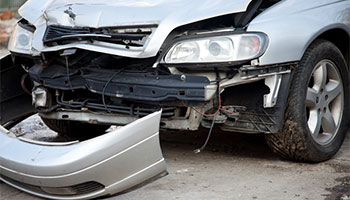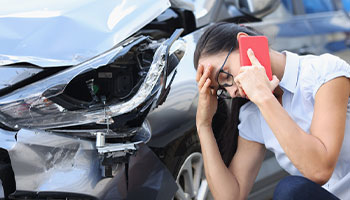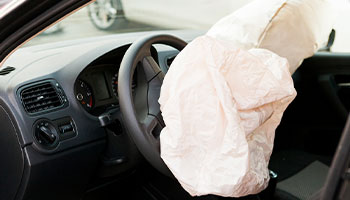
If you are involved in an accident, your car insurance will typically help repair your vehicle depending on your coverage. However, if the repair costs exceed its worth, your insurance company will deem your vehicle a total loss. But what happens when a car is considered totaled? Will your insurance pay you what your car is worth? Let’s explore when insurers declare a vehicle a total loss and what that means for you.
When Is a Car Considered Totaled?

Insurance companies will consider a car totaled or a “total loss” when the cost of repairs exceeds what the vehicle was worth immediately before the damage, also known as its actual cash value (ACV). More specifically, however, insurers must abide by each state’s total loss thresholds. A state’s total loss threshold represents the point at which insurance providers must declare a vehicle a total loss.
Some states rely on a percent threshold, which considers a car totaled after repair costs surpass a set percentage of a car’s value. Florida, for example, has a percent threshold of 80%, which means a vehicle must be declared a total loss if repair costs are 80% or more of its ACV. So, if your car is worth $10,000 and you get into an accident that causes $8,000 or more in damages, your car would be considered totaled.
Other states use a standard total loss formula to determine whether a car is totaled. The total loss formula compares a car’s ACV to its cost of repairs and salvage value, which is the amount a car is worth in its damaged state. If a vehicle’s salvage value and repair costs exceed its ACV, it is considered totaled. For example, let’s say you live in Connecticut (a total loss formula state), have a car with an ACV of $8,000, and get into an accident that causes $10,000 in damages. After assessing the damage, your car’s salvage value is considered $1,000. Using the total loss formula, your car would be declared totaled because the total cost of repairs plus the salvage cost ($11,000) exceeds its ACV.
Why Do Some States Use a Percentage Instead of the Total Loss Formula?
After an accident, a car can have hidden damage that goes unnoticed during the repair process. A vehicle could be considered repaired but have hidden defects, which could lead to a different accident down the line. Because of this, some states utilize a percentage threshold to ensure a car with significant damage is no longer on the road to keep damaged cars out of operation, helping keep drivers safe
What Type of Insurance Covers a Totaled Car?
Whether or not your insurance covers your vehicle after it is declared a total loss will depend on the details of the accident and the coverages you carry. After an accident, you must file a claim using the appropriate coverage to receive an insurance payout for a totaled car, up to your policy’s limits and minus any deductibles.
Here is a quick rundown of insurance coverages that may apply in an accident involving a totaled car.
| Cause of Total Loss | Coverage That Will Apply |
| An accident you caused. | Collision insurance will cover replacement costs, up to your policy’s limits and the vehicle’s ACV, if you cause an accident and total your car. This coverage is often subject to a deductible. |
| Vandalism or damage not caused by an accident. | Comprehensive insurance will cover replacement costs up to your policy’s limits and the vehicle’s ACV, if vandalism, weather accidents, or additional covered perils total your car. This coverage is often subject to a deductible. |
| Accident with an at-fault uninsured or underinsured driver. | Uninsured/underinsured motorist property damage insurance will cover replacement costs (up to your policy’s limits and the vehicle’s ACV) if you’re involved in an accident with an at-fault driver with insufficient insurance. |
| Accident with an at-fault driver. | If another driver is determined to be at fault for an accident that totals your car, you may be able to file a claim through that driver’s property damage liability insurance to receive your car’s ACV. |
What Happens If I Total a Financed or Leased Car?
If you are financing or leasing a car, your lender will likely require you to carry comprehensive and collision insurance, which will help cover replacement costs. If you total a financed or leased car, your insurer will send your lender or leasing company an amount equal to your car’s ACV minus any plan deductibles. But what if you owe more on your car loan than what your vehicle is worth? You’ll be stuck paying the difference out of pocket if you don’t have gap insurance.
Gap insurance, sometimes called loan/lease payoff coverage, fills in the “gap” between what your insurance pays out and what you still owe. This coverage is recommended for newer vehicles due to how quickly cars depreciate when they leave a dealership.
What Should I Do If I Total My Car?

What should you do if you’ve been involved in a car accident and believe your car is totaled? First, prioritize your safety at the accident scene and get proper medical attention if needed. Next, contact the police to begin a document trail of the accident for your insurance. While at the scene, take plenty of photos and exchange contact, vehicle, and insurance information with all parties involved. Once you’re ready to file a claim, here’s how the process will typically go in an at-fault accident:
- Once your vehicle has been towed from the accident scene, contact your insurance provider to file a claim.
- Your insurance provider will put you in contact with a claims adjuster who will work with you throughout the process to determine your insurance payout.
- Your insurer will determine if your car is considered a total loss. If so, you will receive a settlement offer based on your car’s ACV minus your deductible.
- If you are leasing or financing a car, your insurer will first pay your lender, and you’ll receive whatever is left.
- If you own your vehicle, you’ll receive a settlement check equal to your car’s ACV minus your deductible.
If My Car’s Airbags Deploy, Is My Car Automatically Totaled?

Some people believe that if a car’s airbags deploy, it is automatically considered totaled. However, this isn’t always the case. This auto insurance myth stems from the fact that airbags can be expensive to replace.
Although a car accident that causes your airbags to deploy may be severe enough to total a car, it isn’t always a direct indicator. Your insurance will still assess the damage during the claims process to determine whether your vehicle is worth repairing based on regulatory guidelines.
Our Auto Insurance Specialists Are Here to Help
With so many coverages involved, finding the right policy can sometimes feel overwhelming. At AIS, we have over 55 years of experience helping our customers find the best combination of coverage and price from our network of trusted insurance providers. Whether it’s helping you understand state minimums or comparing quotes from multiple insurance partners, our specialists can help. Start a free quote online today, or call us at (888) 772-4247 to get started.
The information in this article is obtained from various sources and offered for educational purposes only. Furthermore, it should not replace the advice of a qualified professional. The definitions, terms, and coverage in a given policy may be different than those suggested here. No warranty or appropriateness for a specific purpose is expressed or implied.